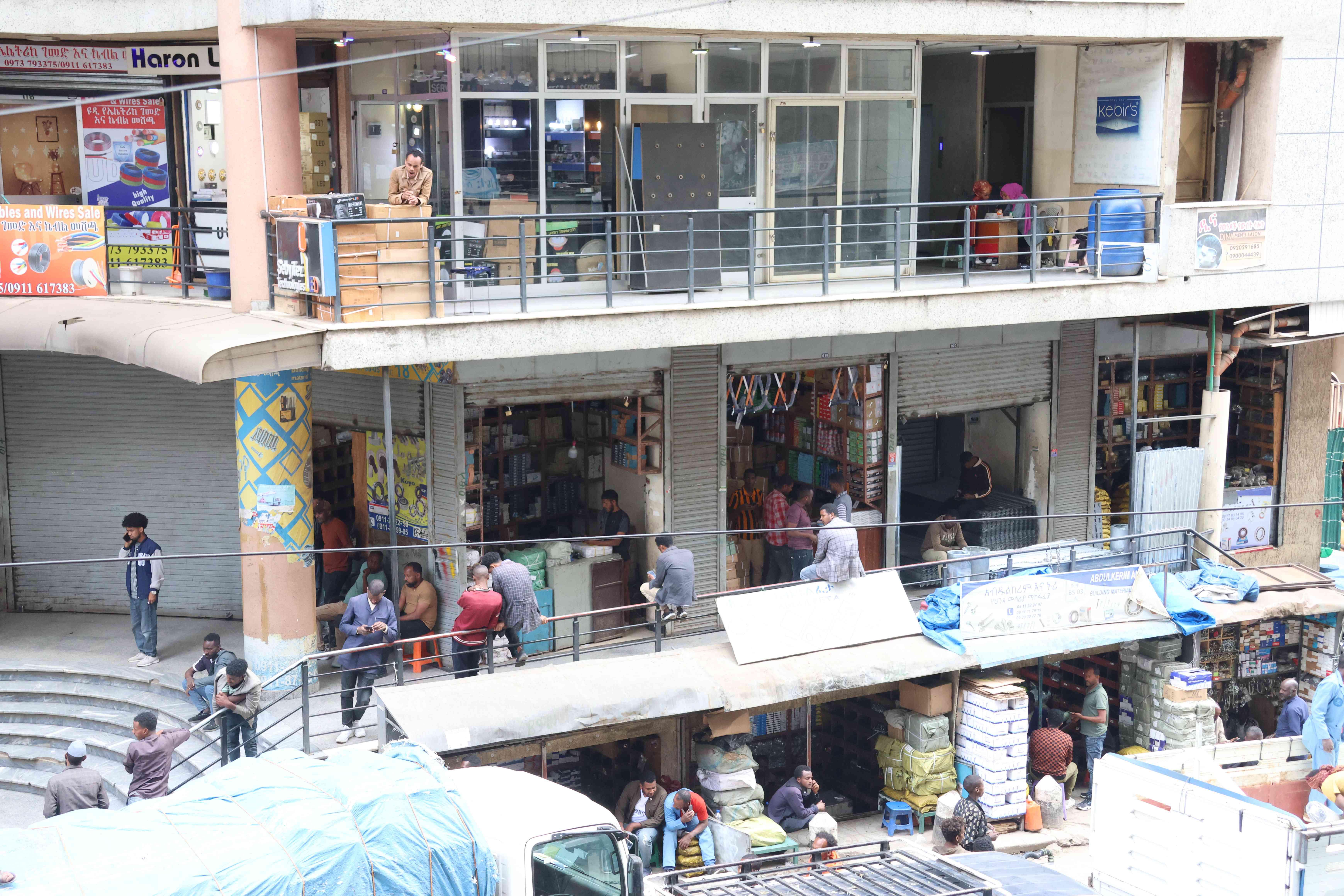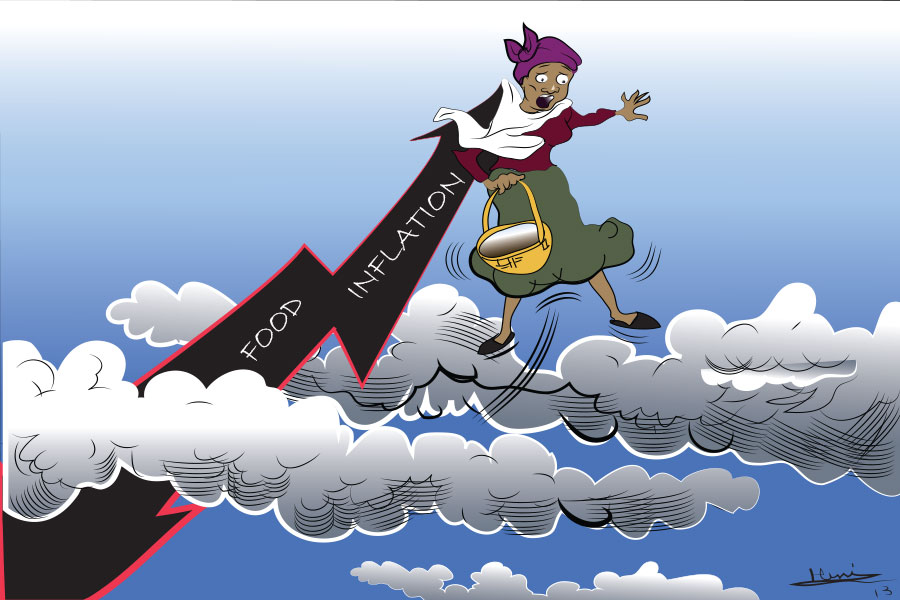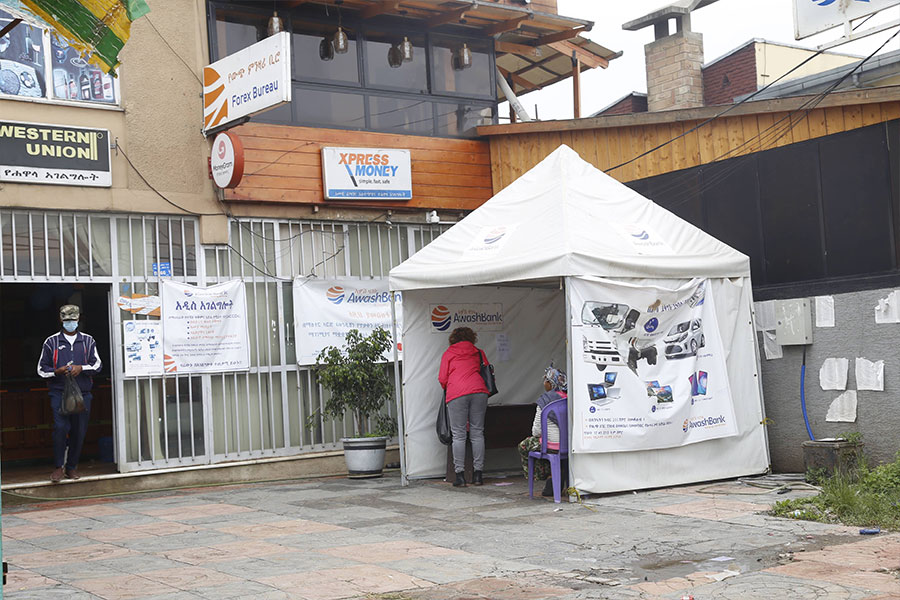
Dec 24 , 2022
By Abraham Tekle
The International Monetary Fund (IMF) estimated that Ethiopia’s GDP grew by two percent last year, which used to be between six and 10pc in the preceding five years.
The value of the Birr has also fallen rapidly since 2017, while inflation remains at double digits despite policy measures taken by the Administration of Prime Minister Abiy Ahmed (PhD). Cooking oil, beverages, bread and cereal prices have dramatically risen. The war between Russia and Ukraine significantly aggravates these markets as they are the major suppliers of wheat, crude and refined cooking oils, and agricultural inputs.
One risk of higher inflation is that it has a regressive effect on lower-income families and older vulnerable living on a fixed income. As prices rise faster than wages, there will be a steep decline in real incomes, putting pressure on institutions that can grow to political instability and social unrest. The recent strike by university teachers could be considered a reflection to reckon with.
Inflation is one of the significant macroeconomic challenges facing Ethiopia’s economy. While the country recorded double-digit average growth rates until 2017, inflation averaged 15pc in the 17 years beginning 2003.
Data from the Central Statistics Service (CSS) indicate that the headline inflation in February this year slightly decreased by one percentage point to 33pc from the month before, while food inflation increased by one percentage point to 41.9pc. In November, inflation had reached 35.1pc, showing a four percentage point increase from the previous month. The price of food items increased, making it difficult for many to carry the burden.
The rising food inflation is resulting in severe food access constraints for low-income and vulnerable households.
Inflation intensifies the problem of poverty and becomes challenging for people in the lower-income groups already living hand-to-mouth. According to the World Bank report in 2020, the national poverty rate declined amid challenging climatic conditions, with recommendations on areas that need profound attention.
Borgen Project is a United States-based organisation monitoring and fighting global poverty. It praised Ethiopia for halving the poverty rate in 15 years, from 44pc in 2000.
“An estimated four Ethiopians escape poverty every minute,” it reported. “Infrastructure developments and continued growth in the agriculture and service sectors helped bolster the nation’s economy and improve living conditions for its people.”
These appear to be generational gains in retreat.
With the pandemic and the civil war in the north, low economic growth has become an additional burden in the past three years, decelerating the figure each year.
The lack of access to capital significantly contributes to poverty traps. Among the economic challenges are unemployment, slow economic growth, debt burden, the balance of payment deficits, steady depreciation of the national currency, and low foreign exchange reserves. The federal government’s increased spending over the two-year war, low agricultural production, and supply chain disruptions induced by the pandemic have pushed the bar high.
Unemployment does not make a drastic change with slight inflationary changes. However, a significant fluctuation could lead to theft, corruption, embezzlement, and money laundering to survive. These recognise the economic, unemployment and social damage that high and volatile inflation can bring.
The costs of unemployment are apparent when viewed from an economic perspective. Its social costs are challenging to measure, leading to broader social unrest. It is essential to increase the productivity of the agriculture and industrial sectors to create job opportunities.
Extravagant spending on projects needs to be reduced while enhancing the productivity of the domestic economy vital. Applying a firm monetary policy helps to create stable economic growth. It is also essential to control the money circulation not to aggravate the already skyrocketing commodity prices. The long-lasting adverse effects will become stubborn if the inflation persists.
PUBLISHED ON
Dec 24,2022 [ VOL
23 , NO
1182]


Agenda | Apr 13, 2025

Editorial | Jul 24,2021

Viewpoints | Apr 09,2022

My Opinion | Jul 18,2021

Agenda | Jul 18,2021

Photo Gallery | 171564 Views | May 06,2019

Photo Gallery | 161804 Views | Apr 26,2019

Photo Gallery | 151537 Views | Oct 06,2021

My Opinion | 136304 Views | Aug 14,2021





Dec 22 , 2024 . By TIZITA SHEWAFERAW
Charged with transforming colossal state-owned enterprises into modern and competitiv...

Aug 18 , 2024 . By AKSAH ITALO
Although predictable Yonas Zerihun's job in the ride-hailing service is not immune to...

Jul 28 , 2024 . By TIZITA SHEWAFERAW
Unhabitual, perhaps too many, Samuel Gebreyohannes, 38, used to occasionally enjoy a couple of beers at breakfast. However, he recently swit...

Jul 13 , 2024 . By AKSAH ITALO
Investors who rely on tractors, trucks, and field vehicles for commuting, transporting commodities, and f...

Oct 4 , 2025
Eyob Tekalegn (PhD) had been in the Governor's chair for only weeks when, on Septembe...

Sep 27 , 2025
Four years into an experiment with “shock therapy” in education, the national moo...

Sep 20 , 2025
Getachew Reda's return to the national stage was always going to stir attention. Once...

Sep 13 , 2025
At its launch in Nairobi two years ago, the Africa Climate Summit was billed as the f...

Oct 5 , 2025 . By NAHOM AYELE
In Meqelle, a name long associated with industrial grit and regional pride is undergo...

Oct 5 , 2025 . By BEZAWIT HULUAGER
The federal government is set to roll out a new "motor vehicle circulation tax" in th...

Oct 5 , 2025 . By NAHOM AYELE
The Bank of Abyssinia is wrestling with the loss of a prime plot of land once leased...

Oct 5 , 2025 . By BEZAWIT HULUAGER
The Customs Commission has introduced new tariffs on a wide range of imported goods i...